De Argentijnse schrijver Ernesto Sabato werd op 24 juni 1911 geboren in Rojas, een dorp in de provincie Buenos Aires. Zie ook alle tags voor Ernesto Sabato op dit blog.
Uit: Before the End (Vertaald door Marina Harss))
How many of those immigrants continued to gaze longingly toward their own mountains and rivers, through the distance of sadness and years, from this huge, chaotic factory, this city constructed on a port, which by then had become a desert of accumulated solitudes?
As I walk through this terrible Leviathan, along the shoreline which was first beheld by thousands of immigrants, I can almost hear the melancholy plaint of Aníbal Troilo’s bandoneón.
When the gloom and tumult of Buenos Aires, Make me feel even more alone, I go to the outskirts at nightfall, and Through the murky landscape of A half century, enriched and destroyed By love and disillusionment, I look back at the boy I once was. Ruefully, I recall Hearing the first drops of rain On the dried-out streets, on the Zinc roofs, “Que llueva, que llueva, la vieja está en la cueva,”3 Until the birds would begin to sing, and We ran, barefoot, To play with our boats made out of paper. That was the time of Tom Mix, Of colored playing chips, Of Tesorieri, Mutis, and Bidoglio, The time of carousels with horses, Of warm peanuts on winter afternoons, Of the toy train and its whistle. A world we can catch sight of When we are very alone, In this chaos of noise and cement, That has no place for courtyards filled with Honeysuckle and carnations.
Among that multitude of colonizers, my parents arrived on these shores with the hope of sowing their seed in this “Promised Land” that extended beyond their tears.
My father descended from a family from the mountains in Italy, people accustomed to the asperities of life. But my mother, who came from an old, established Albanian family, was forced to tolerate the deprivations of her life with dignity.
They settled down in Rojas, which, like many of the old towns on the Pampas, had been one of the many forts built by the Spaniards to mark the borderline of Christian civilization.
In this town in the Pampas my father eventually ran a small flour mill, which became the locus of my daydreams when, on Sundays, he would work in the shop, and my brother Arturo and I would climb up on the sacks of wheat, and secretly, as if committing some mysterious act, spend the afternoon eating biscuits.
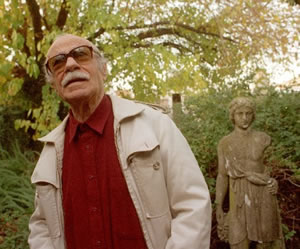
Ernesto Sabato (24 juni 1911 – 30 april 2011)
De Franse dichter, schrijver en vertaler Yves Bonnefoy werd in Tours geboren op 24 juni 1923. Zie ook alle tags voor Yves Bonnefoy op dit blog.
Une photographie
Quelle misère, cette photographie !
Une couleur grossière défi gure
Cette bouche, ces yeux. Moquer la vie
Par la couleur, c’était alors l’usage.
Mais j’ai connu celui dont on a pris
Dans ces rets le visage. Je crois le voir
Descendre dans la barque. Avec déjà
L’obole dans sa main, comme quand on meurt.
Qu’un vent se lève dans l’image, que sa pluie
La détrempe, l’efface ! Que se découvrent
Sous la couleur les marches ruisselantes !
Qui fut-il ? Qu’aura-t-il espéré ? Je n’entends
Que son pas qui se risque dans la nuit,
Gauchement, vers en bas, sans main qui aide.
Encore une photographie
Qui est-il, qui s’étonne, qui se demande
S’il doit se reconnaître dans cette image ?
C’est l’été, vraisemblablement, et un jardin
Où cinq ou six personnes sont réunies.
Et c’était quand, et où, et après quoi ?
Ces gens, qui furent-ils, les uns pour les autres ?
Même, s’en souciaient-ils ? Indifférents
Comme déjà leur mort leur demandait d’être.
Toutefois celui-ci, qui regarde cet autre,
Intimidé pourtant ! Étrange fl eur
Que ce débris d’une photographie !
L’être pousse au hasard des rues. Une herbe pauvre
À lutter entre les façades et le trottoir.
Et ces quelques passants, déjà des ombres.
Un souvenir
Il semblait très âgé, presque un enfant,
Il allait lentement, la main crispée
Sur un lambeau d’étoffe trempée de boue.
Ses yeux fermés, pourtant. Ah, n’est-ce pas
Que croire se souvenir est le pire leurre,
La main qui prend la nôtre pour nous perdre ?
Il me parut pourtant qu’il souriait
Lorsque bientôt l’enveloppa la nuit.
Il me parut ? Non, certes, je me trompe,
Le souvenir est une voix brisée,
On l’entend mal, même si on se penche.
Et pourtant on écoute, et si longtemps
Que parfois la vie passe. Et que la mort
Déjà dit non à toute métaphore.
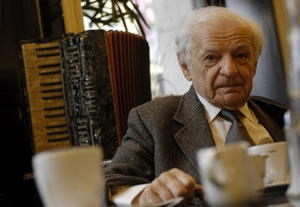
Yves Bonnefoy (Tours, 24 juni 1923)
De Amerikaanse schrijver Scott Oden werd geboren op 24 juni 1967 in Columbus, Indiana. Zie ook alle tags voor Scott Oden op dit blog.
Uit: The Lion of Cairo
“The rasp and slither of steel died away, the sound lost to a wind that howled over snow- clad ridges, pouring into the passes and sheltered valleys of the high Afghan mountains. Ruptures in the leaden sky—a sky that promised little succor from the long winter at the Roof of the World—allowed mocking glimpses of blue heavens and golden light. And a mockery it was, for the sun’s rays did nothing to allay the knife- edged cold, which cut through leather and wool and thick cloth to freeze flesh and stiff en beards.
Still, the two men who faced off on the winding trail to the crag-set village of Kurram paid little heed to wind, cold, or sunlight. Snowdrifts and naked rocks were one and the same as they slowly circled, breath steaming with each panted curse, each seeking an opportunity to bring this struggle to its bloody conclusion. Both fighters sported ragged Afghan turbans and trousers, girdled robes of striped silk and grimy wool, and belts bristling with knife hilts; they were alike in height— but where one was thick waisted with broad shoulders, a bull neck, and gray flecking his beard, the other was young and lean and as graceful as the Turkish saber he held in his scarred fist.
“Baber Khan,” said he, his Arabic punctuated by an Egyptian accent. “Make peace with Allah, for your time is at an end. The blood of Kurram is a poor price for the blood of my master’s servants but it is a price that must be paid.”
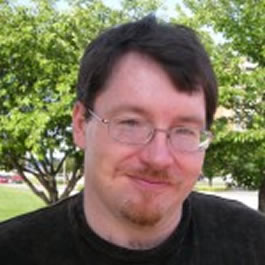
Scott Oden (Columbus, 24 juni 1967)
De Duitse schrijver en criticus Kurt Kusenberg werd geboren op 24 juni 1904 in Göteborg. Zie ook alle tags voor Kurt Kusenberg op dit blog..
Uit: Der m. M.
“Der magische Mensch (m.M.) empfindet die Zeit nicht als ein Kontinuum, nicht als ein Endlos-Band, das sich abspult, sondern als eine Art von Simultanbühne. Die Zukunft ist bereits da, zum Greifen nahe, sie zeigt sich bloß noch nicht.
Die Vergangenheit ist noch nicht abgetreten, sie nistet im Heute; sie wird sich ein wenig entfernen, aber nie ganz passé sein. Wenn man es unbedingt will, kann man die Zukunft sehen, sie wartet ja nebenan auf ihr Stichwort. Die Toten sind nicht tot, sie spielen bloß nicht mehr mit. Aber man kann jederzeit mit ihnen Gespräche führen.
Der m.M. hat wenig oder keinen Sinn für Geschichte, für historische Zeit, denn diese ist ja immer auf den Menschen bezogen, also auf nichts Wichtiges. Er hält es mit der biologischen Zeit, die keine meßbare Einheit ist, sondern viele Spielarten hat; jedes Lebewesen besitzt eine ihm eigene Zeit – eben eine biologische. Die Uhrzeit, eine vom Menschen erfundene Norm, kann zur Gewohnheit werden.
Wer sich jedoch beobachtet, wird feststellen, daß sein Zeitmaß, sein Zeitempfinden sehr verschiedene Tempi hat. Die Zeit vergeht einem rasch oder langsam. Da der m.M. an eine lineare “Entwicklung”, an “Fortschritt” nicht glaubt, ist es nur “logisch”,
daß er in Zyklen denkt und lebt. Die Lehre von den Wellen, die ewige Wiederkehr des Gleichen sind für ihn selbstverständlich. Gerade deshalb empfindet er den Augenblick als etwas Unwiederholbares. Gewiß wird der Augenblick wiederkehren, aber nicht in der
selben Gestalt, denn das Leben imitiert sich nicht. Der nächste Durchgang wird anders
sein.”
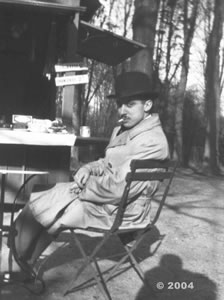
Kurt Kusenberg (24 juni 1904 – 3 oktober 1983)
Eind jaren 1920
De Nederlandse schrijfster en journaliste Magdalena Hermina Székely-Lulofs werd geboren in Soerabaja op 24 juni 1899. Zie ook alle tags voor Madelon Székely-Lulofs op dit blog.
Uit: De hongertocht
“Uit den machtigen tropennacht, uit de loerende, zwarte stilte rondom het bivak spatte onverwachts een roodvonkend schot los, scherp en uitdagend: Pèk-tèkk!!
De echo verdubbelde het prompt: – pèk-tèk-tèk! herhaalde onmiddellijk, maar veel verder al, als een wegijlende, vluchtende spookstem: – èk!… èk… en bij den ingang van het bivak viel een lichaam met een smak voorover op den grond. Het doode lichaam van den inlandschen fuselier Darmo, die juist zou worden afgelost. Het zwaaide en plofte neer, loodzwaar en bijna óp den aflossenden inlandschen fuselier Toegono.
Dit alles gebeurde in dezelfde seconde. Genadeloos vlug, onherroepelijk onverwacht, adembenemend onwaarschijnlijk. Een roode ster, die vlak boven de aarde uiteen spatte, een lichaam, dat op slag dood neerviel en waaruit de ziel omhoog schoot als een plotseling bevrijde schim, die met een laatsten schreeuw wegijlde in de donkerte en verechoënd oploste in het heelal en in de eeuwigheid.
De fuselier Toegono had automatisch aangelegd, maar schoot niet, hij bleef een seconde zoo staan, de karabijn vooruit gestoken, bevangen door een voorbijflitsend moment van onzekerheid. In deze seconde begreep hij niet dadelijk wat er gebeurde, wist hij niet of hij zelf was getroffen door dat onverwachte schot, hij wist ook niet, of Darmo dood was, noch waar vandaan zich in dit oogenblik een vijand op hem kon storten. Maar het volgend oogenblik al kwamen haastige voetstappen nader en de commandant van de wacht vroeg opgewonden:
‘Wat is hier gebeurd?!’
‘Darmo…’ begon Toegono, maar de commandant bukte zich al naar het lichaam, dat voorover neergestrekt lag op den grond.
‘Angkat!’ zei hij kortaf en de twee inlandsche soldaten, die hem gevolgd waren, namen het lichaam op en droegen het weg.
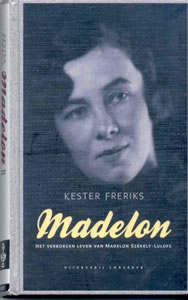
Madelon Székely-Lulofs (24 juni 1899 – 22 mei 1958)
Zie voor nog meer schrijvers van de 24e juni ook mijn vorige blog van vandaag.
